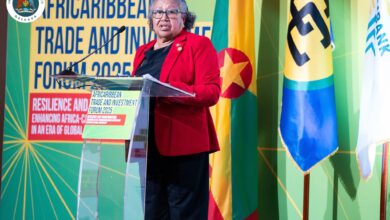Addressing the opening ceremony of Caribbean Connect, a High-Level three-day Symposium today in Bridgetown, on the CARICOM Single Market and Economy (CSME), host Prime Minister Arthur cited the significant potential of a regional labour force in the new Community arrangement.
“The major decisive difference that the coming into existence of the Single Market will make, will arise from its provisions for labour mobility – something that was not contemplated in preceding forms of integration in the Region, nor in any other set of economic policies used in modern times to influence the course of Caribbean development” he said. “Regrettably,” he continued, “the enormous potential of labour mobility to drive Caribbean development, by enabling us to access a regional pool of labour and skills to build more competitive enterprises, sectors and national economies, is being undermined by a fierce xenophobia across the region”.
Nevertheless Prime Minister Arthur urged an appreciation of the progress which is evident: “It must be a matter for some gratification that over the past 18 months, there has been more evidence than in the past of a determination to carry forward the work to bring a Single CARICOM Market and Economy into existence,” he said. “Six countries representing the MDC component of the proposed new regional economy have already made themselves compliant with the requirements to constitute themselves to be part of the Single Market,” he added.
The Prime Minister focussed attention of the participants on the creation of the Caribbean Court of Justice (CCJ) to give greater certainty and predictability to the application of the policies and programmes which will constitute the core of the regional economic integration process. He described as “historic” the decision recently by the regional private sector, to form itself into a more representative body as the CARICOM Business Council, potentially a new, powerful instrument of governance to help plan and oversee the implementation of the proposed CARICOM Single Economy.
Caribbean Connect ends on Friday 30 June.





